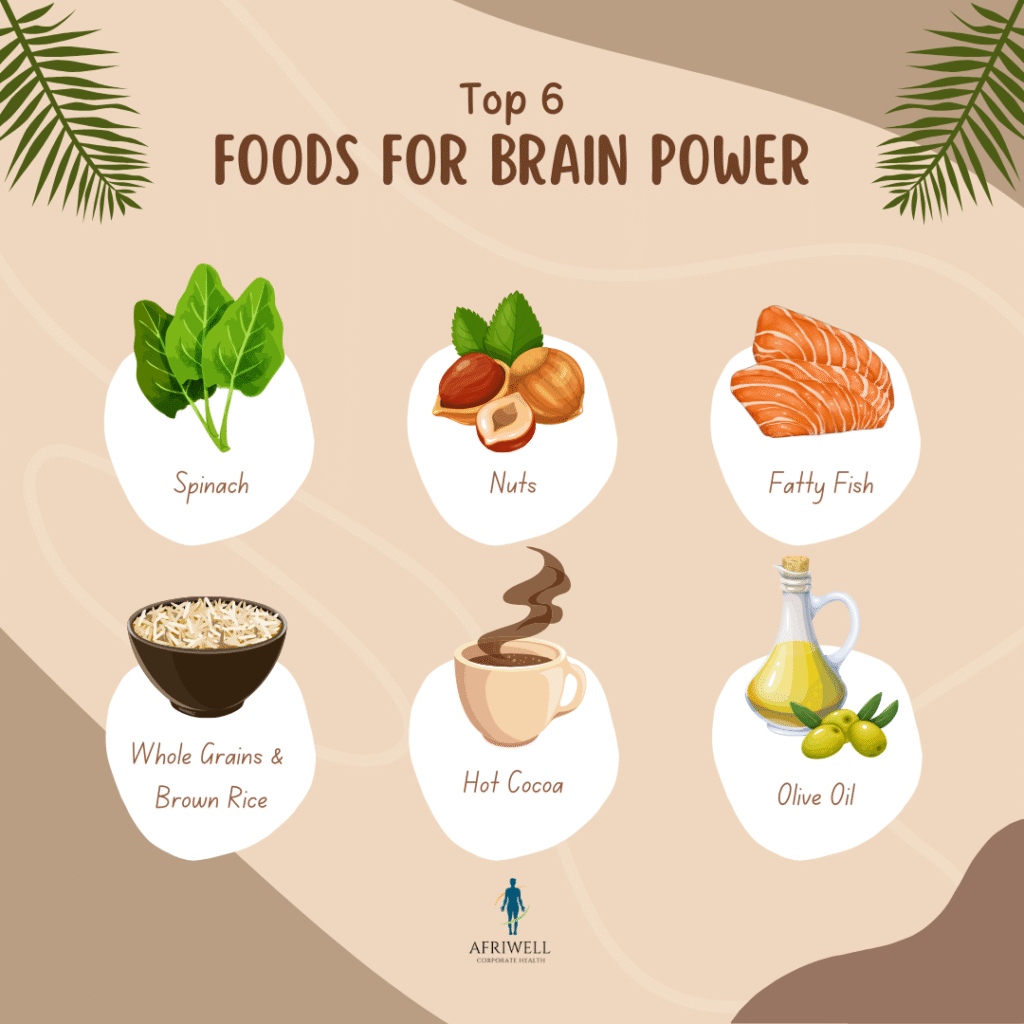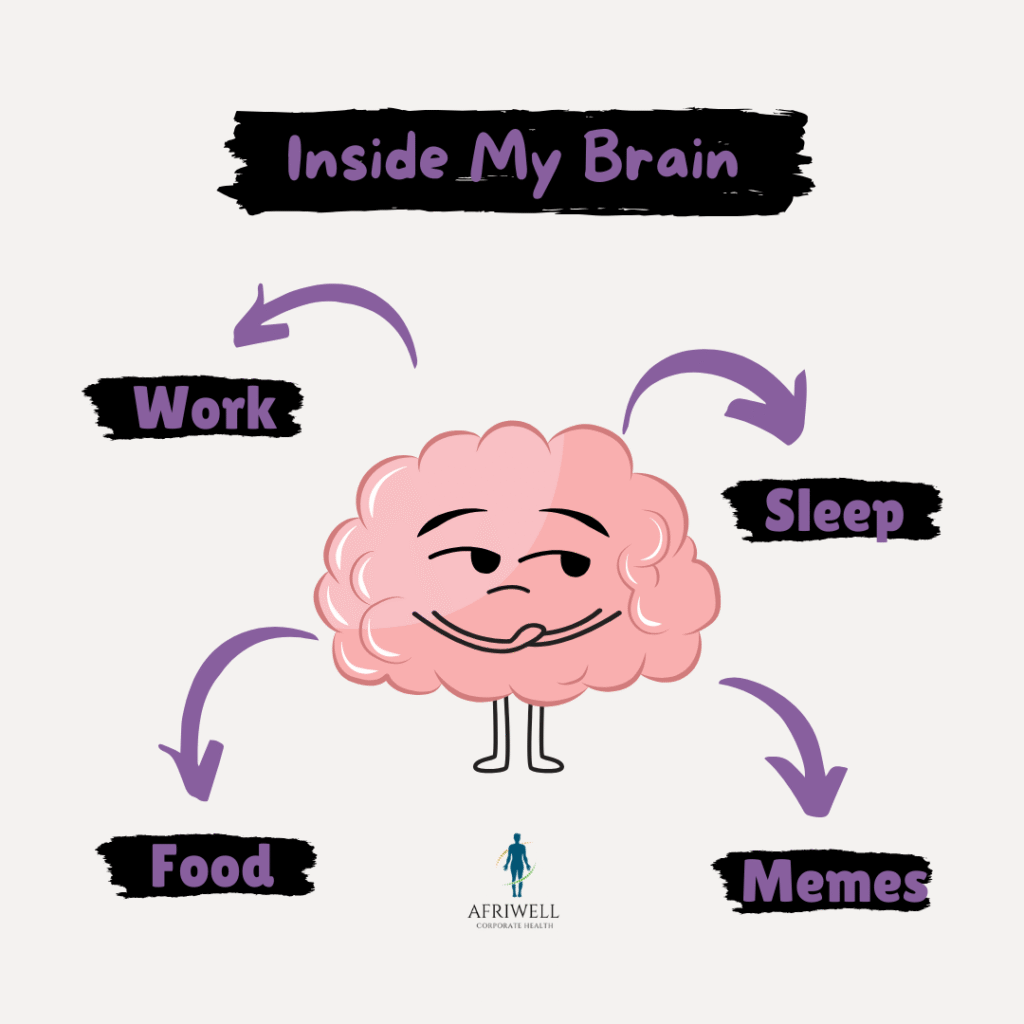
Nutrition & Healthy Living: The Best Brain Foods for Focus and Memory
- July 27, 2025
- 0 Likes
- 243 Views
- 0 Comments
Abstract
Purpose: This article aims to explore the profound connection between nutrition and cognitive function, specifically identifying key brain-boosting foods that enhance focus and memory. It seeks to provide evidence-based dietary recommendations tailored primarily to an African audience, while remaining globally relevant, emphasizing the integration of accessible and culturally appropriate food sources.
Findings: Research consistently demonstrates that a diet rich in omega-3 fatty acids, antioxidants, B vitamins, flavonoids, and adequate hydration significantly supports brain health. Specific foods such as fatty fish, berries, leafy green vegetables, whole grains, and legumes contribute to neuroprotection, improved neurotransmitter function, and reduced inflammation, all critical for optimal cognitive performance. Traditional African dietary patterns, often characterized by diverse plant-based foods, lean proteins, and healthy fats, naturally align with many of these brain-healthy principles.
Research Limitations/Implications: While the article synthesizes current scientific understanding, further region-specific research is needed to fully understand the bioavailability and impact of nutrients from diverse African food systems on cognitive outcomes. The implications suggest that promoting balanced nutrition, leveraging local food resources, and addressing micronutrient deficiencies can be powerful, cost-effective strategies for public health initiatives aimed at improving cognitive function across all age groups.
Practical Implications: Healthcare professionals, educators, and policymakers can utilize these findings to develop targeted nutritional guidance and public health campaigns. Emphasizing the inclusion of locally available brain-healthy foods can empower individuals and communities to make informed dietary choices that support lifelong brain health, potentially mitigating the burden of cognitive decline.
Social Implications: Enhancing cognitive function through nutrition has broad social benefits, including improved academic performance in children, increased productivity in adults, and sustained independence in older populations. This can contribute to stronger communities and national development by fostering a healthier, more intellectually vibrant populace.
Originality/Value: This article offers a unique synthesis of global nutritional science with a specific focus on its applicability and cultural relevance within the African context. By highlighting accessible food sources and practical integration strategies, it provides actionable insights for improving brain health through diet in diverse settings.
Keywords: Brain foods, cognitive function enhancement, improved focus and memory, holistic nutrition strategies, traditional African dietary patterns, essential omega-3 fatty acids (DHA, EPA), powerful antioxidants (flavonoids, anthocyanins), vital B vitamins (folate, B12), neuroprotection, cognitive resilience, public health initiatives, micronutrient support, sustainable food systems.
Article Type: Secondary Research

1. Introduction: Fueling the Mind for a Brighter Future
In our fast-paced world, the demands on our cognitive abilities—our capacity to focus, remember, and process information—are ever-increasing. From students preparing for exams to professionals navigating complex tasks, and elders striving to maintain mental sharpness, optimal brain function is a cornerstone of a fulfilling and productive life. While genetics and lifestyle factors play a role, the profound impact of what we eat on our brain health is increasingly undeniable. Our brains, though accounting for only about 2% of our body weight, consume roughly 20% of our daily caloric intake, underscoring their immense nutritional needs (Raichle & Gusnard, 2002).
This article delves into the fascinating world of brain-boosting nutrition, identifying key food groups and nutrients that are scientifically proven to enhance focus, sharpen memory, and protect against cognitive decline. While the principles of healthy eating are universal, we aim to tailor these insights primarily to an African audience, recognizing the rich diversity of traditional diets, the availability of unique local ingredients, and the specific nutritional challenges and opportunities present across the continent. By highlighting accessible, affordable, and culturally appropriate food choices, we hope to empower individuals and communities to nourish their minds for a brighter, more focused future.
2. The Brain-Food Connection: Why What You Eat Matters
The brain is an intricate organ, constantly working, learning, and adapting. Its optimal performance relies on a steady supply of specific nutrients that support its complex structures and functions. A diet lacking in these essential components can lead to inflammation, oxidative stress, and impaired neurotransmitter production, all of which can negatively impact cognitive abilities (Gómez-Pinilla, 2008). Conversely, a diet rich in neuroprotective compounds can enhance brain plasticity, improve blood flow, and support the growth of new brain cells, fostering sharper focus and a more robust memory.
3. Key Brain Foods for Focus and Memory
Let’s explore the powerhouses of nutrition that can transform your cognitive landscape:
3.1. Omega-3 Fatty Acids: The Brain’s Building Blocks
Omega-3 fatty acids, particularly docosahexaenoic acid (DHA) and eicosapentaenoic acid (EPA), are crucial for brain health. DHA is a major structural component of brain cell membranes, essential for communication between neurons. Research suggests that adequate omega-3 intake can improve memory, learning, and overall cognitive performance, and may even reduce the risk of neurodegenerative diseases (Swanson et al., 2012).
- Sources:
- Fatty Fish: Mackerel, sardines, salmon, and tuna are excellent sources. In many African regions, freshwater fish like tilapia and Nile perch, and various marine fish, are readily available and can be a vital part of the diet.
- Flaxseeds and Chia Seeds: These plant-based sources provide alpha-linolenic acid (ALA), which the body can convert into EPA and DHA, albeit less efficiently. They can be easily added to porridges, smoothies, or baked goods.
- Walnuts: Another good plant-based source of ALA.
3.2. Antioxidants: Protecting Your Brain from Within
Antioxidants combat oxidative stress, a process that can damage brain cells and contribute to cognitive decline. By neutralizing harmful free radicals, antioxidants protect neural pathways and support healthy brain aging.
- Sources:
- Berries: Blueberries, strawberries, raspberries, and even local African berries (where available) are packed with anthocyanins and other flavonoids, powerful antioxidants linked to improved memory and cognitive processing (Subash et al., 2014).
- Dark Leafy Green Vegetables: Spinach, kale, collard greens (known as sukuma wiki in East Africa), and other traditional African leafy vegetables are rich in vitamin K, lutein, and beta-carotene, all beneficial for brain health.
- Dark Chocolate: High-quality dark chocolate (with at least 70% cocoa) contains flavonoids, which can improve blood flow to the brain and enhance cognitive function.
- Colorful Fruits and Vegetables: A wide array of fruits and vegetables like oranges, bell peppers, tomatoes, and carrots provide a spectrum of antioxidants.
3.3. B Vitamins: The Energy Regulators
B vitamins, including B6, B9 (folate), and B12, play a critical role in brain health by supporting energy production, neurotransmitter synthesis, and nerve function. Deficiencies can lead to fatigue, poor concentration, and memory issues.
- Sources:
- Whole Grains: Millet, sorghum, unrefined maize (for ugali), brown rice, and oats are excellent sources of B vitamins and provide sustained energy for the brain.
- Eggs: A versatile and affordable source of B vitamins, especially B12, and choline.
- Legumes: Beans, lentils, and peas are rich in folate and other B vitamins. These are staples in many African diets.
- Lean Meats: Beef, chicken, and fish provide B vitamins, particularly B12.
3.4. Flavonoids: Enhancing Brain Connectivity
Flavonoids are plant compounds known for their antioxidant and anti-inflammatory properties. They can improve blood flow to the brain, protect neurons, and enhance synaptic connections, leading to better memory and learning.
- Sources:
- Tea and Coffee: Both green tea and coffee contain flavonoids and other compounds like caffeine and L-theanine (in green tea) that can improve alertness, focus, and mood.
- Citrus Fruits: Oranges, lemons, and grapefruits are rich in various flavonoids and vitamin C.
- Apples and Grapes: Also good sources of different types of flavonoids.
3.5. Choline: The Memory Nutrient
Choline is an essential nutrient vital for the production of acetylcholine, a neurotransmitter critical for memory and learning. Adequate choline intake is particularly important during brain development.
- Sources:
- Eggs: The yolk is a primary source of choline.
- Beef Liver: A highly concentrated source.
- Soybeans and Peanuts: Plant-based sources of choline.
3.6. Hydration: The Unsung Hero
Often overlooked, adequate hydration is fundamental for optimal brain function. Even mild dehydration can impair concentration, mood, and memory (Popkin et al., 2010). Water helps transport nutrients to the brain, remove waste products, and maintain the electrical activity of neurons.
- Source: Water! Make it a habit to drink plenty of clean water throughout the day. Herbal teas and water-rich fruits and vegetables also contribute to hydration.

4. Dietary Patterns for Brain Health: Lessons from Tradition
Beyond individual foods, the overall dietary pattern significantly influences brain health. The Mediterranean Diet, characterized by high intake of fruits, vegetables, whole grains, legumes, nuts, olive oil, and moderate fish consumption, is widely recognized for its cognitive benefits (Singh et al., 2014).
Interestingly, many traditional African dietary patterns naturally align with these brain-healthy principles. These diets often emphasize:
- Plant-based foods: Abundant use of diverse vegetables, fruits, and legumes.
- Whole Grains: Staples like millet, sorghum, and traditional maize varieties.
- Lean Proteins: Fish, poultry, and legumes.
- Healthy Fats: From sources like palm oil (in some regions), groundnuts, and avocados.
- Limited Processed Foods: Historically, these diets were low in refined sugars, unhealthy fats, and processed ingredients.
Revisiting and celebrating these traditional eating habits, while adapting them to modern contexts, can be a powerful strategy for promoting brain health across Africa.
5. Practical Tips for an African Audience: Making Brain Food Accessible
Integrating brain-healthy foods into daily life doesn’t have to be complicated or expensive. Here are some practical tips:
- Embrace Local Markets: African markets are treasure troves of fresh, affordable, and nutrient-dense foods. Prioritize seasonal fruits and vegetables, local fish, and legumes.
- Cook at Home: Preparing meals at home gives you control over ingredients, allowing you to minimize processed foods, excess sugar, and unhealthy fats.
- Traditional Recipes, Modern Twist: Adapt traditional recipes to maximize brain-boosting ingredients. For example, add more leafy greens to stews, incorporate groundnuts into sauces, or use whole grains for ugali or porridges.
- Snack Smart: Instead of processed snacks, opt for a handful of groundnuts, a piece of fruit, or a hard-boiled egg.
- Stay Hydrated: Carry a reusable water bottle and sip throughout the day. Infuse water with slices of fruit like lemon or cucumber for a refreshing twist.
- Address Micronutrient Deficiencies: In some regions, micronutrient deficiencies (e.g., iron, zinc, B12) can impact cognitive function. Consult with a healthcare professional or nutritionist if you suspect a deficiency, and explore fortified foods or supplements if necessary.
- Community Gardens: Participate in or initiate community gardens to increase access to fresh produce and promote healthy eating habits.
6. Conclusion: Nourishing Your Brain, Empowering Your Life
The evidence is clear: what we eat profoundly impacts our brain’s ability to focus, remember, and thrive. By consciously choosing foods rich in omega-3 fatty acids, antioxidants, B vitamins, and flavonoids, and by prioritizing hydration, we can actively support our cognitive health throughout life. For our African audience, this means celebrating and re-embracing the wisdom of traditional diets, leveraging the abundance of local, nutrient-dense foods, and making informed choices that resonate with cultural practices and economic realities.
Nourishing your brain is not just about avoiding disease; it’s about unlocking your full potential, enhancing your daily experiences, and building a foundation for a healthier, more vibrant future for yourself, your family, and your community. Let’s make every meal a step towards a sharper mind and a brighter tomorrow.
References
Gómez-Pinilla, F. (2008). Brain foods: The effects of nutrients on brain function. Nature Reviews Neuroscience, 9(7), 568-578. https://doi.org/10.1038/nrn2421
Popkin, B. M., D’Anci, K. E., & Rosenberg, I. H. (2010). Water, hydration, and health. Nutrition Reviews, 68(8), 439-458. https://doi.org/10.1111/j.1753-4887.2010.00304.x
Raichle, M. E., & Gusnard, M. A. (2002). Appraising the brain’s dark energy. Trends in Neurosciences, 25(1), 48-52. https://doi.org/10.1016/S0166-2236(01)02005-4
Singh, B., Parsaik, A. K., Mielke, M. M., Erwin, P. J., & Knopman, D. S. (2014). Association of Mediterranean diet with cognitive health: A systematic review and meta-analysis. Journal of Alzheimer’s Disease, 39(4), 727-737. https://doi.org/10.3233/JAD-131707
Subash, S., Essa, M. M., Al-Adawi, S., Memon, M. A., Manivasagam, T., & Akbar, M. (2014). Neuroprotective effects of berry fruits on neurodegenerative diseases. Neural Regeneration Research, 9(1), 32-38. https://doi.org/10.4103/1673-5374.126137
Swanson, D., Block, R., & Mousa, S. A. (2012). Omega-3 fatty acids EPA and DHA: Health benefits throughout life. Advances in Nutrition, 3(1), 1-7. https://doi.org/10.3945/an.111.000893



Leave Your Comment